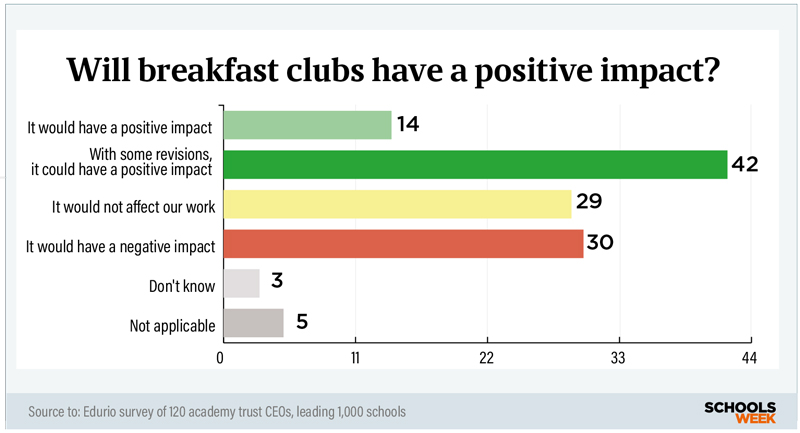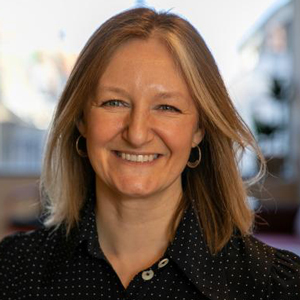Primary schools invited to trial Labour’s flagship free breakfast clubs have pulled out or are having to take a financial hit after being told that the basic funding rate is just 60p per pupil.
Up to 750 primary schools will be funded as part of an early adopter scheme to roll out free breakfasts for all pupils from April.
The government has set aside £315 million for the full roll-out. But impact assessment documents for the schools bill state that “exact are costs being finalised and agreed”, and suggest that any extra “costs will then fall to schools”.
Heads involved in the pilot scheme are already saying that funding does not cover costs.
‘We just can’t afford it’
Paul Bertram, a headteacher at Buxworth Primary School, says his school currently charges £2.75 for its own hour-long breakfast club with a sports teacher on site, with 30 pupils attending on average.
He told Schools Week he had to pull out of the trial because it would leave him with a £9,000 shortfall.

“For 30 children, with all your staff, your food and the cost of the premises, it’s not a lot,” he said of the government allowance.
Funding documents for the trial, seen by Schools Week, show schools will get a one-off £500 set-up payment to cover things like equipment and materials. They will also get a lump sum of £1,099 to cover “start-up staffing costs” for the summer term.
An arrears payment will then be made later this year based on the number of pupils taking part.
The basic rate is just 60p per pupil, per day. However, an additional 78p per pupil per day will be added based on the proportion of free school meal pupils at the school.
Per pupil payments for special schools are £3.23.
Government ‘confident’ schools can meet expectations
An FAQ sent to schools by the government states they are “confident that the funding rate will enable schools to meet the minimum expectations” of a 30-minute breakfast club “based on existing provision operating in schools”.
But Bertram said: “We discussed it as a governing body and we just couldn’t afford to run at a loss. If this is the best they can offer, they are going to struggle with putting the policy nationally across the whole of the country.”
Another CEO said 15 of his schools were invited to take part, with four selected as they already have a breakfast club run by Greggs.
He said it was “likely we would lose 70p per child when you include staffing and food”.
The other 11 schools will not be taking part because the trust would lose income from its wraparound care and “wouldn’t be able to cover the scale of staff required”.
While he strongly believes in the breakfast club scheme, he says scale is an issue.
“If all the children arrive in one go for half an hour, I’m not sure I’ll be able to fit them in the hall. What breakfast clubs shouldn’t be is just a feeding station.”
Schools face shortfalls of thousands
Simon Kidwell, principal at Hartford Manor primary school, in Cheshire, has calculated the scheme could leave his school with a £4,000 shortfall.
To “break even” they would have to increase their planned pupil-to-staff ratio or reduce food expenditure.

“As you can see, the margins are very tight and we haven’t accounted for any admin costs, staff training costs, heating, lighting or energy associated with food preparation,” he said.
The government’s impact assessment states that schools will benefit financially from the breakfast clubs, as the policy allows them “to reallocate their budgets to other priority areas”.
It also says it will save parents more than £400 per year and help children to concentrate.
Time and space also (costly) issues
But there are wider concerns about the financial hit to schools when the scheme is rolled out nationally.
Oxfordshire County Council has agreed to spend £120,000 to identify barriers to roll-out – including any extra costs.
A survey of trust leaders by Edurio, commissioned by Schools Week, found funding was a “recurring” concern, analysis of their responses by ChatGPT stated.

One leader said the current pilot project funding was “so poor it won’t cover food, let alone staff”. Also, the free clubs would “cannibalise existing breakfast clubs’ income streams, which are more needed than ever [in] primary schools”.
Another, who had a small school in the early adopter scheme, said the “amount of time it takes to provide lunches and clear [them] away” suggests 30 minutes for breakfast with similar numbers “will be impractical”.
Another leader said that, if all 1,000 pupils at one of their schools attended, they would “not be able to accommodate them in one space and this would have considerable impact on staffing”.
Kidwell added: “We’re not entirely sure what the government intends the scheme to achieve. Is the breakfast club designed to support families financially, help parents get to work on time, or improve school attendance?
“Clearer guidance is essential to help us create the best possible provision.”
Poorest schools already get breakfast help
Around 12% of state schools in England already offer a taxpayer-subsidised breakfast club through the government’s national school breakfast scheme, the Institute for Fiscal Studies has said.
These are schools in the areas with the highest level of deprivation – meaning that some of the poorest schools already do provide breakfasts.

Kellogg’s provides its own grants to fund breakfast clubs at 650 primary schools and 200 secondary schools.
Lindsey MacDonald, chief executive officer at the Magic Breakfast children’s charity, told an education select committee last week that funding for breakfast clubs was “not anywhere near” enough.
“You’re limiting and stifling innovation and schools to take the context that they operate within… schools will attempt to pick up those costs themselves, and it will be diverted from other much-needed budget lines in school systems,” she said.
The IFS has previously reported that food-only provision – where pupils would have breakfast in the classroom – would cost around £55 per pupil per year. A traditional before-school breakfast club would cost £110 per pupil.
The IFS concluded that Labour’s funding would cover food-only provision for all pupils, or for 60 per cent of children in a traditional breakfast club model.
‘Stretching budgets to breaking point’
Julie McCulloch, policy director at the Association of School and College Leaders, said inadequate funding would “stretch already challenging budgets to breaking point and risk disruption to any existing wrapround care”.

Meanwhile on Thursday, the government updated its guidance for the early adopter scheme with information on how schools can exit the pilot. It said the programme was “intended to test delivery and generate learning for national roll-out.
“Given this, the department does not expect schools to exit the early adopters scheme and will work with early adopter schools to overcome challenges encountered.”
Should a school “wish to exit”, they must notify the department and “engage on potential solutions”. If they do still want to leave, parents must be given one term’s notice.
A Department for Education spokesperson said the clubs will help “break the unfair link between background and success”.
They are “working closely” with applicants and “set out the details” of the 750 early adopter schools “in due course”. They were originally due to be announced in “early 2025”.













Your thoughts